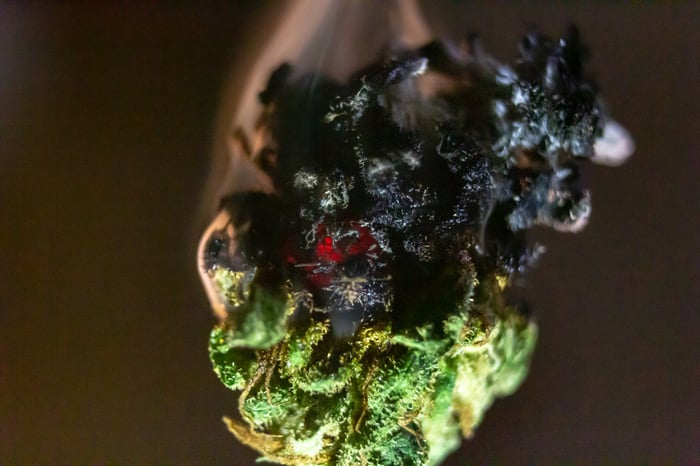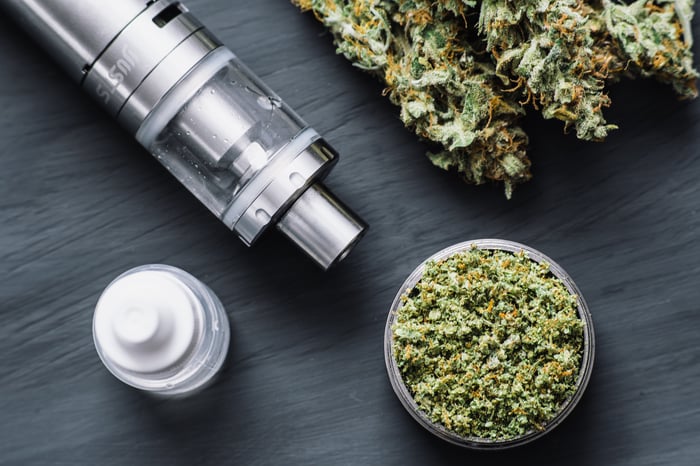Forget about renewable energy. "Going green" with marijuana stocks may very well be one of the best investments you can make this decade.
According to New Frontier Data, the U.S. pot industry should deliver average annual growth of 21% between 2019 and 2025, ultimately leading to sales of more than $41 billion by mid-decade. Meanwhile, cannabis-focused analytics company BDSA foresees Canadian weed sales rocketing from $2.6 billion in 2020 to an estimated $6.4 billion by 2026. The old adage as an investor is to follow the money, and it's most definitely going to pot stocks.
Unfortunately, not all cannabis stocks will be winners. No matter how successful or fast-growing an industry is, there are always underperformers. As we move headlong into June, the following three pot stocks stand out for all the wrong reasons and should be avoided like the plague.

Image source: Getty Images.
Aurora Cannabis
For more than a year, I've offered up my take on which marijuana stocks should be avoided on a monthly basis. I don't believe I've once failed to include Canadian pot stock Aurora Cannabis (ACB 2.24%). Even though Aurora has been a consistently popular stock with millennials on online investing app Robinhood, it's just not a well-managed company, and its operating results show it.
A little over three weeks ago, Aurora Cannabis lifted the hood on its fiscal third-quarter operating performance. It featured net sales of 55.2 million Canadian dollars ($45.7 million U.S.), which represents a decline of 25% from the previous year. In particular, recreational weed sales were more than halved, which the company primarily blamed on coronavirus restrictions and a one-time transition to a contract sales team. While Canada's legal pot sales have grown at a steady pace, Aurora continues to shrink.
It also keeps burning a lot of cash. Even with the company enacting significant cost-cutting initiatives, Aurora burned through CA$86.3 million in cash in Q3 2021, which was up slightly from the CA$84.6 million it went through in the sequential quarter. The only reason Aurora's cash balance is even up from the previous year is because the company continues to dilute its shareholders with share sales and at-the-market offerings.
Speaking of share-based dilution, Aurora's share count has increased from a reverse-split-adjusted 1.35 million shares in June 2014 to about 198 million shares by March 31, 2021. Over just the past year, the company has issued close to 89 million shares. Long-term investors are constantly under assault by management's inability to control costs and grow the business.
With a mountain of idle assets and ongoing dilution, Aurora Cannabis remains one of the worst pot stocks you can buy.

Image source: Getty Images.
Cronos Group
On the other hand, having a mountain of cash isn't always the answer. Just ask the shareholders of cash-rich Canadian cannabis stock Cronos Group (CRON 1.05%).
Back in December 2018, Cronos landed itself a whale. Tobacco giant Altria Group (MO -0.74%) -- the company behind the premium Marlboro brand -- agreed to invest $1.8 billion for a 45% stake in the company. Armed with a boatload of capital, it was assumed that Altria would help Cronos develop and market higher-margin derivative products, such as vapes. But in spite of this equity stake, Cronos has completely floundered.
As of the end of March, Cronos had approximately $1.24 billion in cash, cash equivalents, and short-term investments remaining. It spent about $225 million (along with another $75 million in stock) helping to acquire the Lord Jones brand of cannabidiol-based beauty products in the U.S. and has seen its cash pile dwindle as losses have piled up. As for the Lord Jones purchase, Cronos recognized a measly $2.44 million in first-quarter sales.
In fact, this is a common theme for Cronos. While I'm not shy about pointing the finger at companies like Aurora Cannabis, which expanded far too quickly, Cronos deserves a finger wag for doing too little. The company's best quarter to date is the measly $12.6 million in sales it reported in the first quarter. That's an annual run-rate of $50 million in sales for a company carrying a $3.05 billion market cap. Even if you take the cash out of the equation, it's not fundamentally prudent to pay $1.8 billion for a consistently unprofitable business that's taken this long to hit an annual run-rate of $50 million in sales in one of the fastest-growing industries on the planet.
Until Cronos Group demonstrates significant top-line growth, there's absolutely no reason to own this pot stock.

Image source: Getty Images.
Sundial Growers
Last but not least, we have retail traders' favorite pot-based meme stock, Sundial Growers (SNDL 1.24%). As you'll see, penny stocks almost always trade at penny valuations for good reason.
Sundial was caught up in the short-squeeze craze that hit the market in late January and early February. As a penny stock with high short interest in a fast-growing industry, it was one of the most sought-after companies by retail traders, at least for a short time. But as we've seen, fundamentals always matter.
In Sundial's case, both its operating performance and the actions of management have been a disappointment. Beginning in October 2020, management sought to reduce or eliminate Sundial's debt load by raising capital. The company executed debt-to-equity swaps, conducted at-the-market share offerings, and sold shares via direct offerings.
The problem is that management hasn't stopped selling stock to raise capital. Between Sept. 30, 2020 and May 7, 2021, Sundial Growers' outstanding share count has ballooned from 509 million to 1.86 billion. That's an incredible amount of dilution and a slap in the face to long-term shareholders.
Although Sundial has built up a CA$1.08 billion cash war chest, its management team doesn't have any concrete plans for what it wants to do with this cash. If there's a bright side here, Sundial is in absolutely no danger of going bankrupt. Then again, the arrow isn't pointing up, either.
With so many shares outstanding and an $800 million at-the-market offering underway, Sundial has virtually no chance of ever producing meaningful earnings per share and may require a reverse split just to remain listed on the Nasdaq exchange.
As the icing on the cake, the company's traditional cannabis operations produced only CA$9.9 million in net sales in the first quarter, which is down 29% from the prior-year period. No matter how you slice the data, Sundial is likely the worst pot stock money can buy.





